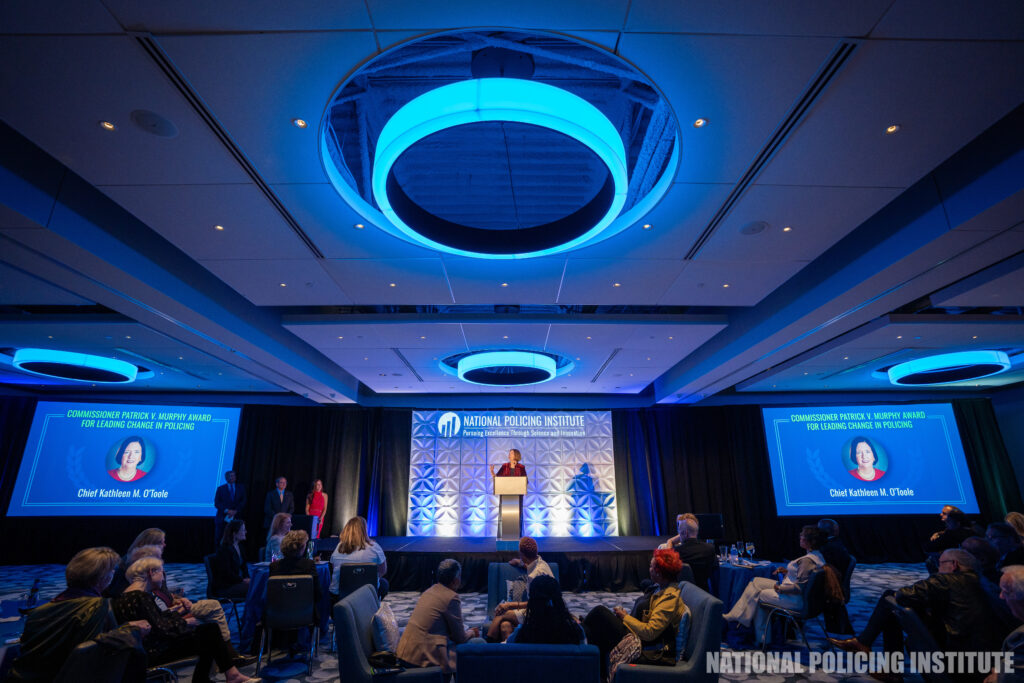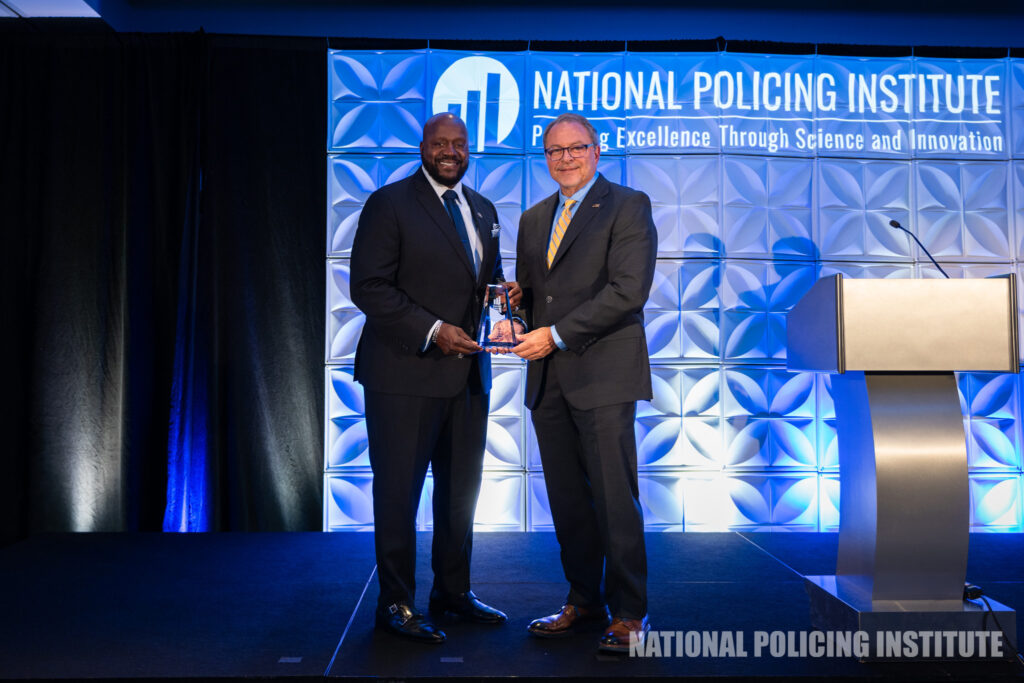2024 Commissioner Patrick V. Murphy Leading Change in Policing Award Honoree
Chief Kathleen M. O'Toole
Chief Kathleen M. O’Toole is a lawyer and career police officer whose princip led leadership and groundbreaking public safety reform efforts have impacted agencies both domestically and internationally. Her record of excellence is derived from her strong ethics, inclusiveness, and commitment to enacting positive and far-reaching change.
led leadership and groundbreaking public safety reform efforts have impacted agencies both domestically and internationally. Her record of excellence is derived from her strong ethics, inclusiveness, and commitment to enacting positive and far-reaching change.
As Boston’s first female police commissioner, she served as a role model to women who followed her in law enforcement. As a member of the Independent Commission on Policing (Patten Commission) during the Northern Ireland Peace Process, she set a standard for bringing calm and accountability to a volatile decades-long conflict. Her emphasis on community policing while leading the police force in Seattle has left a lasting impact there and elsewhere.
For these reasons, Chief O’Toole is presented the 2024 Commissioner Patrick V. Murphy Award, which honors a police professional who has taken bold steps to improve, reform, or advance policing from within the profession.
Chief O’Toole’s career began in 1979 when, while attending law school, she accepted the position of patrol officer with the Boston Police Department. During her early career, she was a beat cop, decoy officer, detective, and supervisor. She rose through the ranks of policing in Massachusetts, having served as Chief of the Metropolitan District Commission Police, Lieutenant Colonel overseeing Special Operations in the Massachusetts State Police, Massachusetts Secretary of Public Safety, and Boston Police Commissioner. She later served as Seattle’s Chief of Police.
On the opposite side of the Atlantic, Chief O’Toole’s community responsiveness and leadership during turbulent times led to her involvement with the Northern Ireland Peace Process, where she was a member of the Independent Commission on Policing. She also served on a panel to reform the Northern Ireland Prison Service and was a member of the Independent Commission on the Future of Policing in England and Wales. She completed a six-year term as Chief Inspector of the Garda Síochána Inspectorate and, more recently, chaired the Commission on the Future of Policing in Ireland.
Chief O’Toole has provided services as a subject matter expert to the US Department of Justice Civil Rights Division. She was the monitor of a federally supervised consent decree involving the East Haven, CT, Police Department and is currently the lead compliance evaluator of a settlement agreement in Springfield, MA. She was an advisor to the Illinois AG’s Office during the development of a reform agreement with the City of Chicago.
Chief O’Toole has substantial private sector experience as well. She is a partner at 21 st Century Policing Solutions and the founder of O’Toole Associates LLC, an international consulting firm. As a practicing attorney, she has represented clients on civil matters and acted “of counsel” to a Boston law firm. She has provided a diverse range of consulting services to multi-national corporations and currently serves on the boards of two tech companies. She is also a member of several non-profit boards and committees.
In the academic arena, Chief O’Toole earned a Bachelor of Arts degree from Boston College, a Juris Doctor from New England School of Law, and a PhD at the Business School of Trinity College Dublin. She recently co-authored a book, Seven Ways to Fix Policing Now. She regularly provides lectures at academic institutions throughout the US and Europe and presents frequently at professional conferences. She was an adjunct faculty member at Northeastern University, University of Ulster, and Seattle University.
"I don’t believe in a top-down approach to policing, but rather a grassroots approach, listening carefully to officers on the front lines and those living in the neighborhoods we serve. If you engage authentically with your officers and the community, the likeliness of success is far greater."
Chief Kathleen M. O'Toole
While maintaining a demanding work schedule over the years, Chief O’Toole’s first priority has always been her family—her husband, Dan, a retired Boston Police detective, their daughter, Meghan, and granddaughter, Madeline.
2024 Hubert Williams Equal Justice and Effective Policing Award Honoree
Sheriff Jerry L. Clayton

Jerry L. Clayton is a 36-year criminal justice professional who has spent his career promoting cultural and structural change by focusing on community wellness and engagement. His work to understand the needs of his constituents has promoted fairness and equality in the jurisdictions and agencies with which he has worked and impacted those under his leadership and instruction.
It is for these reasons Sheriff Clayton is presented the 2024 Hubert Williams Equal Justice and Effective Policing Award, which recognizes a police professional who champions and promotes fairness, equal justice, and civil rights of all.
Completing his fourth term as sheriff of Washtenaw County, Sheriff Clayton is the longest-serving and first Black sheriff. He leads an organization of approximately 400 staff, serving a population of over 370,000 and covering a 720-square-mile geographical area. The sheriff’s office’s service delivery strategy focuses on community engagement, co-creating community wellness and safety, and organizational fiscal responsibility.
As sheriff, he has led several impactful initiatives that fundamentally changed the community landscape in Washtenaw County, including Law Enforcement Assisted Deflection and Diversion (LEADD), Co-Response Teams, MAT, Strategic Inmate Management, Unified County SWAT and CNT, Unified Active Assailant Response, Integrated Mental Health, and Crisis Negotiations Teams.
Sheriff Clayton has served as a front-line corrections officer, deputy sheriff, and command officer. He was also appointed to the executive positions of corrections commander, police services commander, and SWAT team commander.
For more than 30 years, Sheriff Clayton has been a certified criminal justice trainer and instructor, specializing in a multitude of subject areas, including use of force/subject control disciplines, physical training, special weapons and tactics, cultural diversity, preventing racial profiling, staff management and supervision, and organizational culture and leadership.
“If you can create well communities – making sure people have housing, food, and jobs – safety improves. Safety is a byproduct of a well community.”
Sheriff Jerry L. Clayton
Sheriff Clayton has designed and instructed a variety of training programs and workshops, including Court Security Officer Training, Cultural Diversity Training for Law Enforcement Professionals, Preventing Biased Police Practices (suite of training courses for executives, officers, front-line supervisors, and field training officers), Enhancing Law Enforcement and Community Trust Workshop, and Civility Workshop. He provides consulting services as a contracted Technical Assistance service provider and instructor for the US Department of Justice - National Institute of Corrections, assisting in developing and delivering various training curricula to local, state, and federal correctional agencies nationwide.
Sheriff Clayton served as a member of several federal courts-appointed compliance monitoring teams to assess various police agencies' compliance with court-ordered consent judgments focused on departmental practices involving staff training, use of force, management and supervision, and conditions of detainee confinement.
Sheriff Clayton has provided training and subject matter expert consulting services to various private and public sector clients, including the National Sheriffs’ Association and American Civil Liberties Union.
In 2019, he served as a governor-appointed Jail and Pretrial Incarceration Task Force member, charged with developing and forwarding criminal justice reform recommendations to the governor and state legislature.
He also served as a commissioner and chairperson for the Michigan Commission on Law Enforcement Standards (MCOLES) from 2013 to 2018. Sheriff Clayton is a governor-appointed member of the Michigan Jail Reform Advisory Council as well as an appointed member of the Michigan Black Leaders Advisory Council.
Sheriff Clayton serves on the boards of numerous local and national organizations. These include the Washtenaw Area Council for Children, the local chapter of NAMI (National Alliance on Mental Illness), the Washtenaw County Mental Health Treatment Court Advisory Board, the Washtenaw County Continuum of Care Board (Ending Homelessness), and the New York University School of Law-Policing Project Advisory Board. He previously served as a member of the Vera Institute of Justice- Policing Program Steering Committee and the National Policing Institute’s (formerly National Police Foundation) Council on Police Reform and Race. He is also a member of numerous other community service and law enforcement organizations.
Sheriff Clayton has received international recognition for his work in the criminal justice field. In 2016, he was invited as a law enforcement representative to attend an international community policing conference in Barcelona, Spain. In 2017, at the invitation of the United Nations High Commission on Human Rights, Sheriff Clayton was a representative from the United States and presenter at an international conference on law enforcement and bias-based policing in Geneva, Switzerland.
In 2020, he was elected a founding member of the Council on Criminal Justice, an independent and nonpartisan national invitational membership organization and think tank focused on advancing the understanding of criminal justice policy choices and developing solutions that enhance safety and justice for all.
Sheriff Clayton attended Eastern Michigan University and Cleary University, graduating with a bachelor’s degree in business administration. He also graduated from the EMU School of Staff and Command and numerous other leadership programs. He is married to his wife of over 30 years, Sybil, and has three children.










































